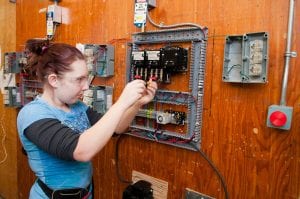Caleb Showers-Cornell may not have been an obvious candidate for a career in the trades — at his high school in East Vancouver, he was enrolled in the International Baccalaureate program. It’s advanced placement, typically for students with academic ambitions.
“It’s all geared toward getting you ready for university — exposing you to the stresses of university,” said Showers-Cornell, 19.
“Despite social pressures, university isn’t for everyone — there are plenty of reasons to go into the trades”
But that experience is part of what led him to take a hard turn away from university, and go into the electrical trades program at the British Columbia Institute of Technology (BCIT). Read the full story via CBC News, written by Rafferty Baker on September 6, 2019.
Also, listen to the segment on CBC Early Edition with Stephen Quinn.

Following the CBC interview, we sat down with Caleb to hear more about his experience in the trades industry. Caleb debunked some of the common misconceptions in the industry, shared his advice for prospective students, and discussed the industry’s support for diversity and inclusion.
Which program are you currently enrolled in?
I am enrolled in the Electrical Apprenticeship program. Currently Level 2.
Tell us about your educational background and/or work experience.
Prior to attending BCIT for the Electrical Apprenticeship program, Level 1 in October 2017, I was in high school for 5 years at Britannia Secondary School on the east side of Vancouver, where I participated in the International Baccalaureate (IB) Program. IB is a university preparation program offered worldwide.
Within three days of completing Level 1 of the Electrical Apprenticeship program at BCIT, I immediately secured a job with an electrical contracting company, TDR Electric. I have been employed there for a year and a half and I have loved what I have learned and experienced from that job.
What made you choose the Electrical Apprenticeship program?
I’ve been fascinated by electricity since I was a toddler. More than half of the books I read as a child were do-it-yourself home repair and electrical books. When I actually got to work on a home being renovated by my father, I realized that pursuing an electrical career could be a legitimate option and one that I would possibly love doing. When I was approached by Karen Larsen and Wendy Gilmour of the VSB’s AceIt program, it seemed like the right the place to be and I took a chance.

How would you describe the program that you’re in at BCIT?
Since all apprenticeship programs in Canada are a mixture of field experience and classroom learning, it is nothing like a typical university course. As a registered apprentice, I spend approximately 40 weeks per year employed, working full time, and accumulating work hours that count toward my certification. To qualify for certification as an electrician, one must complete 6,000 hours of work experience. In order to qualify, one must also complete all 4 levels of classroom training, 10 weeks per level.
What’s a typical day like for you?
A typical day at work mostly involves reading the architect’s blueprints and recreating their vision for where all of the electrical devices will go and how they will all work.
A typical day at school usually involves a lecture on a particular concept of how electricity works, a series of practice equations, and often a bit of time in one of the labs in the Electrical Training Centre to see the concept work in real life.
Why did you choose a trades program over university?
Mostly because I need to be mentally engaged in problem-solving every day and this career does that for me. Also as mentioned, I find electricity so cool. It also helps immensely that I will leave my 4-year degree not only with no debt but also having actually made money, as will all of my colleagues. As a handy bonus, the government of British Columbia heavily subsidizes all electrical training courses and allows apprentices to collect EI for the 10 weeks a year they must attend classes
What are some of the common misconceptions that people have about the trades program/industry? What’s the truth behind each?
The most common misconception is that we weren’t intelligent enough to get into university. The study of electricity is not only more difficult than some university degrees but also, in my opinion, a choice made by people who are looking out for themselves and their financial future. These individuals are not just following the pack.
The second common misconception is that we are dirty, or lower class than the “academics”. While it is true that we can get a little dusty and we do have to work hard, once you complete your 4-year apprenticeship your career prospects are very promising and offer lots of flexibility.
Electricity is everywhere. Electricity is silent, hidden, most people don’t think about about it, yet it makes the western world tick.
What advice would you give for a high school student who is considering a career in trades?
Go for it. They literally pay you to go to school and it only takes a few years. If you want to go to university afterwards, you absolutely can too. If you decide to go to university afterwards, you won’t have to work a minimum wage job to make rent because you now have a real and acquired skill that allows you to make a decent wage while going to school. No matter what happens in your life, you can always fall back on your skill and get employed in a matter of hours, not months.
Where do you see yourself in five years from now?
I’ve always dreamed of being both the client and the contractor so that I can do work to the high standard that I’ve always wanted to, and be accountable to myself and my own timeline. For this reason, as soon as I can, I would like to invest in the most run-down piece of property I can find in Vancouver, fix it up myself and with some help from other trades, sell it for a profit, and do it again. Someday I plan for this practice to replace my day job.

Does the industry support diversity and inclusion?
It’s a work in progress. It’s not completely lost its “old boys club” charm. However, I will say that I have never heard anything intended to do harm said by any of my colleagues. The electrical trade is more inclusive to women and the LGBTQ community than any other trade. The young and smart people that dominate this industry are supportive of diversity.
What would you like to see for the trades industry?
I would really like to see more people knowing what the trades industry is really like. It seems like every person I talk to thinks I work in Area 51. No one knows what it’s like or what’s going on in the trades and that needs to change.
Anything else or fun facts that you’d like to share about your experience in trades?
Fun fact is electricians get little bites from electricity constantly. Whenever someone asks if we get shocks, I ask them if plumbers get wet. People ask if I’m afraid of electricity and I say no, but you should be. We’re trained for four years to know what’s safe and what’s unsafe, to know which shocks will hurt you and which won’t. We all wear shock-proof boots all day at work so a little bite from a regular outlet won’t do more than wake us up and remind us we’re still alive (and to go turn the power off!). But we’re all knowledgeable enough to know to NEVER go near unless three people are sure it’s off and we’ve tested it ourselves. That kind of knowledge is why we can’t have just anyone walking into places where shock hazards exist.
Also, I couldn’t believe this until I heard it every single day at work. Every other person who isn’t an electrician calls us “sparkys”.
Have you subscribed? Sign-up to receive the latest news on BCIT.
